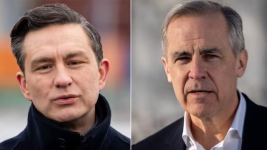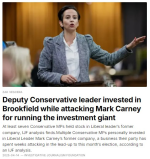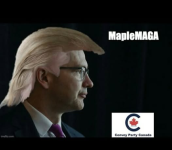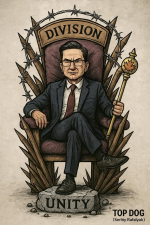Shiftless2
Well-known member

Democracy Inc.
seprntoSod201f011m2a72g09im0h1954h020i0m7518m206hf582f52alh2 ·
Pensions killed, offices shut, benefits clawed, a billion dollars unspent, and more.
Tom Beaver and Ron Clarke
Tom Beaver and Ron Clarke are co-founders of the veterans’ Anyone But Conservative campaign. Both served many years in the Canadian military.
Veteran Ron Clarke
Ron Clarke gives an emotional address at a June 4, 2014 rally in Ottawa protesting government treatment of vets. Photo by Fred Chartrand, Canadian Press.
Last year retired general Rick Hillier, the former head of the Canadian Military, spoke about high rates of suicide and mental anguish among Canadian soldiers returning home:
“I do not think we had any idea the scale and scope of what the impact would be. I truly do not. This is beyond a medical issue. I think many of our young men and women have lost confidence in our country to support them.”
And why would they not, given the callousness of the Harper government? In the past decade Conservatives closed offices, cut 900 jobs, clawed back benefits, killed lifetime pensions for Afghanistan veterans, and failed to spend $1.13 billion of the Veterans Affairs budget but found money to increase advertising and ceremonies for politicians to honour veterans.
Here are seven ways the Harper government has waged war on its own veterans.
1. Conservatives kill lifetime pensions for veterans
On April 6, 2006, the Conservative government enacted the New Veterans Charter, which represented the greatest change to veteran care since the Second World War. While the bill was conceived and passed by the previous Liberal government, Harper championed the policy shift even after it came to light it was failing veterans.* It erased the obligation for Canada to care for injured veterans and their families and replaced life-long monthly pain-suffering payments (in place since the First World War) with a lump sum payment.
By removing the right to a pension, injured and disabled veterans lost between 30 and 90 per cent of their entitlements, and even those payments and benefits were subject to claw back.
Lump sum payments for permanently disabled soldiers have proven so meagre that, as Veterans ombudsman Pat Strogan put it, “Deputy ministers make more on average in one year than a person who loses two legs in Afghanistan can expect to be paid out for the rest of their life.”
When veterans took the Conservative government to court, the government spent $700,000 to declare it was under no obligation to provide veterans with any special treatment.
Financial Post editor Matt Gurney summed up Harper’s intent, calling the one-time cheques “almost an act of cruelty” that leave injured veterans of recent operations “measurably worse off than they would have been under the old system.”
But Harper turned a cold shoulder to veterans like Kevin Berry, who pleaded, “We are left with our wounds, our scars, and the realization that our government has turned its back on us. You have forgotten.”
2. Harper minister insults veterans, closes nine veterans offices
Despite numerous reports of service failures and lack of support for veterans, the Harper government shut down nine Veterans Affairs offices to save $3.78 million and the same year increased its advertising budget by more than $4 million to buy playoff hockey ads.
The shutdowns laid off 89 employees, leaving eight workers to cover 17,000 veterans. In Sydney, Nova Scotia, one person was to do the work of 13 employees who had handled 4,200 clients.
Harper claimed the office closures would mean better services for veterans.
Last year, then minister of veteran affairs Julian Fantino was forced to apologize to a delegation of veterans after he showed up late to a scheduled meeting about the cuts, got in an argument and left. He blamed unions. Veterans called for his resignation, and Fantino was later demoted by Harper.
Given the same Harper government has “billions to spend on tax cuts and other benefits,” a Globe and Mail headline asked the obvious question: “Why do the Conservatives treat veterans so poorly?”
3. Auditor General finds Harper government failing veterans
Auditor general Michael Ferguson found the Conservative government was failing returning injured veterans by imposing up to eight months waiting time for mental health help.
“Damning,” the National Post called the report, noting the percentage of returned soldiers with mental health issues had increased six-fold between 2002 and 2014. “One statistic that jumped from the report was a 24 per cent refusal rate for veterans applying for disability benefits. That means 3,684 soldiers who believed they needed benefits to deal with mental health issues were refused on first application. After appeals, 2,841 potentially disturbed veterans have been cast adrift -- they are not tracked by Veterans Affairs and nobody knows whether they are a danger to themselves or anyone else.”
The Conservative government, knowing the report was coming, played misleading defence. It announced it would inject $200 million into the system over six years for mental health services -- only later admitting the money was not over six years but over half a century.
4. Conservatives slash 900 jobs despite pleas from managers
The Harper government launched the largest cuts to staff at Veterans Affairs in history. When they were finished, nearly 900 jobs or about one-quarter of the staff had been cut, with some of the biggest cuts coming in the disability awards branch.
Senior Veterans Affairs managers have warned every year since 2009 that the department needed more to meet the needs of its clients, but the government continued to slash staff and failed to spend millions of dollars allocated to help veterans.
Not a single Conservative MP stood up for veterans, rejecting a motion to cease cuts at Veterans Affairs. Result: a backlog of six to eight months in providing some care to veterans.
The cuts are killing morale within Veterans Affairs, according to a Statistics Canada report, staff saying the quality of their work has suffered has more than doubled since 2008.
Meanwhile, the government paid out more than $500,000 in bonuses over two years to Veteran Affairs managers as a reward to cutting budgets.
CONTINUED










